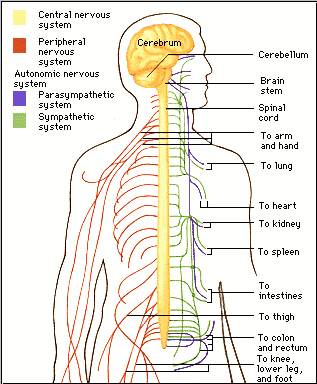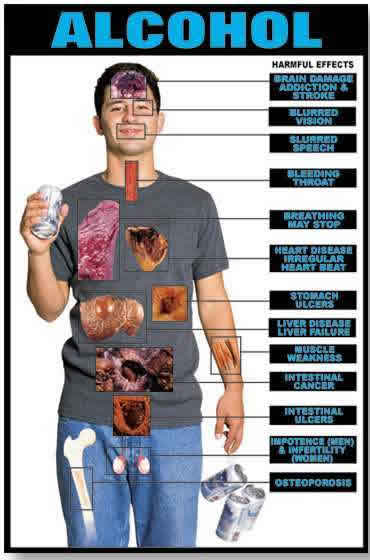Alcohol.
ON THE BRAIN AND CENTRAL NERVOUS SYSTEM
Alcohol is a depressant, which slows down the central nervous system and can cause drowsiness, relieve pain and induce sleep.
- Drinker experiences mild euphoria and loss of inhibition as alcohol impairs region of the brain controlling behavior and emotions. Alcohol impairs behavior, judgment, memory, concentration and coordination (shortened attention span, impaired problem solving abilities), as well as inducing extreme mood swings and emotional outbursts.
- Alcohol acts as a sedative on the central nervous system, depressing the nerve cells in the brain, dulling, altering and damaging their ability to respond appropriately. Large doses cause sleep, anesthesia, respiratory failure, coma and death.

- Impaired or distorted visual ability and hearing (affects ability to distinguish between sounds and perceive the direction they are coming from) ; dulled smell and taste (reducing the desire to eat) and loss of pain perception; altered sense of time and space
- Impairs fine motor skills, and slows reactions.
- Numbness and tingling in the arms and legs caused by nerve damage from depletion of thiamine (B vitamin); when severe, can damage other nerve endings, causing staggering, etc. (Wernicke's Encephalopathy).
- Long term drinking may result in permanent brain damage (Korsakoff's Syndrome or 'wet brain'), serious mental disorders, and addiction to alcohol.
ON THE LUNGS
- Lowered resistance to infection.
- High amounts of alcohol may cause breathing to stop, then death.
STOMACH/INTESTINAL/DIGESTIVE
- Irritation and damage of esophagus lining, induces severe vomiting, hemorrhaging, pain and difficulty swallowing. Can contribute to throat cancer.
- Irritation of stomach lining, can cause peptic ulcers, inflammation, bleeding lesions and cancer. Minute blood loss may deplete the body's iron stores, causing irritability, lack of energy, headaches and dizziness.
- The pancreas becomes stressed from having to create insulin to process the sugar present in alcohol. This creates a significant risk of pancreatitis, a chronic inflammation that can be fatal. - rly menopause and menstrual irregularities are common in women who drink excessively.

- Irritation of the intestinal tract lining and the colon
- Nausea, diarrhea, vomiting, sweating and loss of appetite are common.
- Alcohol impairs the small intestine's ability to process nutrients and vitamins.
- Chronic drinking may result in inflammation, ulcers, and cancers of the intestines and colon.
BONES
- Alcohol interferes with the body's ability to absorb calcium, resulting in bones being weak, soft, brittle and thinner (Osteoporosis).







